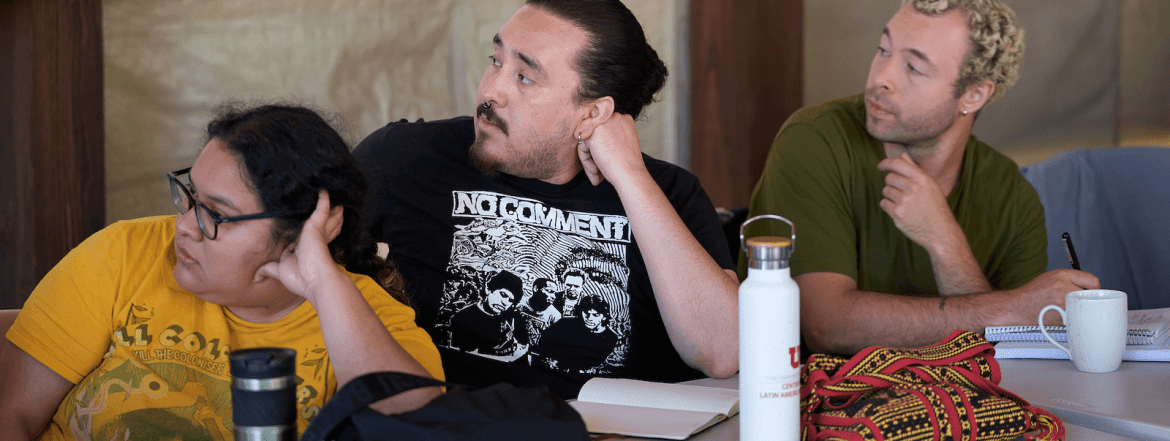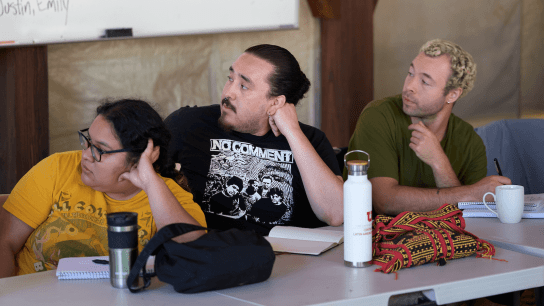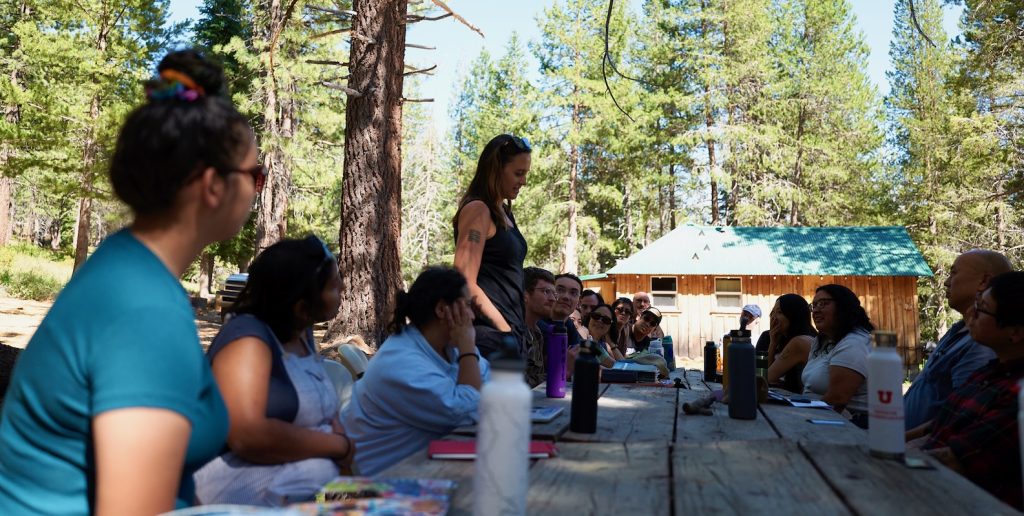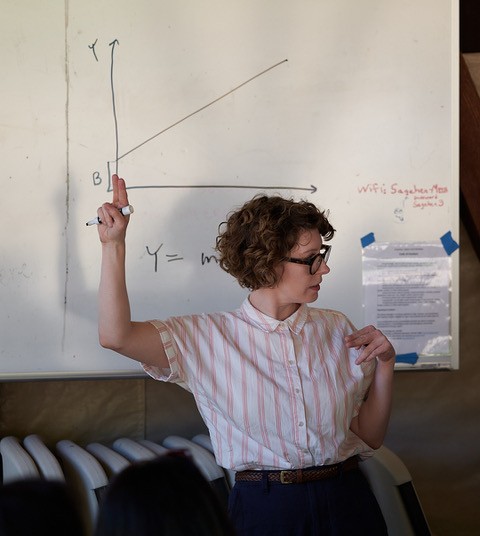Marxist Institute for Research: An Interview with Annie McClanahan and Robert Nichols
by
Annie McClanahan (UC Irvine) and Robert Nichols (UC Santa Cruz) spoke to UCHRI Research Grants Program Director, Sara Černe, about the reach, graduate student involvement, and sustainability of the Marxist Institute for Research, which was first funded by UCHRI in 2022-23 and secured a renewal grant for 2023-24.
“To keep costs low, but also to model communal praxis, the faculty cook all the meals and the students do the clean-up: we are all mutually and collectively responsible for our space and sustenance.“
Tell us about your project and the ways in which the Marxist Institute for Research has grown far beyond a traditional faculty working group.
Traditional faculty working groups tend to be relatively small, closed networks of researchers working in-person on substantively or thematically related topics. Although the Marxist Institute for Research (MIR) began with this template, it soon expanded and grew beyond this model in several ways. First, the organization is more genuinely interdisciplinary than the standard working group. What brings us together as researchers and teachers is not a specific discipline, nor even a particular substantive topic of investigation. Instead it is a concern for Marxism as a broad intellectual and political tradition. Since we are unified by this as a mode of understanding the world and orienting ourselves towards it, our group includes researchers from a wide variety of fields (including geography, history, literature, politics, and philosophy), working on a diverse array of topics (such as war, poverty, crime, or cultural production). Second, MIR sees graduate student researchers working alongside and in collaboration with faculty in a unique manner. The group incorporates graduate student participation in every stage of planning and implementation of projects, from the initial brainstorming sessions, to execution and debriefing. A final feature that makes our group stand out is that we are a cross-campus network. MIR makes every effort to include faculty and graduate students from every campus in the University of California system, thereby building a state-wide network that refuses the hierarchies and divisions between institutions.
How has your research focus on Marxism influenced the organizational principles of your working group, modes of collaboration, and approaches to planning the summer institute?
MIR is committed to historical materialist research into the processes that generate conditions of injustice, insecurity, domination, and exploitation. More than this, however, the group is also committed to changing these conditions by imagining and enacting more just social relations. To this end, our organizational structure is maximally organized around democratic collaboration and material equity. In the Summer Seminar, for instance, we provide full funding for all our graduate student participants and distribute work equitably, being mindful to disrupt and dislodge existing hierarchies, such as between faculty and students. Additional events held throughout the year are designed to be open and accessible to the widest possible community, including those outside our existing research networks.
“Over our two years, we received 250 applications for the five-day Summer Seminar at the UCNRS Sagehen Creek Research Center and have been able to support 40 graduate students.”
What do you see as the main impact of your work and what advice can you offer to other faculty looking to leave a mark and successfully engage different audiences within the university and beyond?
The most significant part of our work so far is probably the MIR Summer Seminar, which will run for the second time this August. Over our two years, we received 250 applications for the five-day Summer Seminar at the UCNRS Sagehen Creek Research Center and have been able to support 40 graduate students. Each Summer Seminar features two guest faculty seminars, five seminars on Capital by the MIR core faculty, and the “Mike Davis Keynote Lecture.” To keep costs low, but also to model communal praxis, the faculty cook all the meals and the students do the clean-up: we are all mutually and collectively responsible for our space and sustenance.
Between the Summer Seminar, the on-campus research groups, and the online and in-person public events, we are reaching hundreds of UC faculty and graduate students. One thing that has been crucial to our success is to make sure we have maximally broad representation: all UC campuses, across the social sciences and the humanities, and including both graduate students and faculty. In particular, we have been in consistent conversation with the graduate students who make up a core part of our network, supporting them in creating and sustaining campus-level reading groups as well as producing a large archive of scholarly, pedagogical, and organizational resources from our collective experience as scholars and teachers of the Marxist tradition. It was very important to us, for instance, to make sure that the Summer Seminar was completely free of charge for the students, which has required a lot of creativity but was made easier by the support of campus-level Humanities Centers and Labor Centers, many of which have generously helped by supporting 1-2 students each year from their individual campus. We have also been particularly grateful for the existence of the UC Natural Reserve System, which has allowed us to run the Summer Seminar for far less than it would have cost elsewhere!
How have the two rounds of UCHRI grant funding helped you implement your goals and what are the main challenges you face as you continue the work of the Marxist Institute for Research?
We couldn’t have done any of this without UCHRI, and we were especially grateful for the (all too rare!) opportunity to apply for a second round of Multicampus Faculty Working Group funding to help sustain the project and create a solid proof-of-concept. The first grant made it possible for us to begin to imagine what we wanted to do, and to embark on the somewhat daunting task of creating the first Summer Seminar. The second grant ensured that we could, as we had initially hoped, make this a truly durable and enduring project. The grants have helped us create research groups on almost every UC campus, enabled us to meet together alongside some graduate student representatives for a winter planning meeting, and supported the Summer Seminar.
“We were especially grateful for the (all too rare!) opportunity to apply for a second round of funding to help sustain the project and create a solid proof-of-concept.“
Beyond the challenges of running and administering a truly systemwide network and ensuring that we have funding for the years to come, the biggest challenge has simply been that there are so many graduate students, faculty, and instructors in the UC system who want to be a part of our work and events! We quickly learned, for instance, that we had to use an online-event hosting platform that could enable at least 1000 participants for any of our public online events. Most of all, we are aware that we have had almost 250 applications to the Summer Seminar over the last two years and have only been able to accept 40; we hope in future years not only to build the capacity of the Seminar, but also to find other ways to support graduate students and other UC researchers toward creating similar local or regional events.
Photo credit: Joshua Clover




